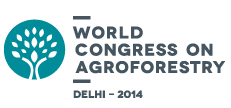Edible, multi-purpose Australian acacias for Agroforestry farming systems in Africa’s dry lands
Edible, multi-purpose Australian acacias for Agroforestry farming systems in Africa's dry lands
wca2014-1886 Peter J. Cunningham 1,*Salifou Yaou 2Tony Rinaudo 3 1SIMaid, Tarrington, Australia, 2World Vision, Niamey, Niger, 3World Vision, Melbourne, AustraliaFarmers in dry land areas of Africa are becoming increasingly vulnerable to climate change. Environmental degradation, high population growth, diminishing and unreliable rainfall contribute to low crop yields and extreme poverty. While progress has made through Farmer Managed Natural Regeneration (FMNR), soil amelioration techniques and organic inputs there is a need for improved farming systems to keep pace with rising food demands and rainfall instability. A new farming system called “The Farmer Managed Agroforestry Farming System (FMAFS)” has been developed in Niger’s 450 mm rainfall zone. The FMAFS incorporates FMNR, improved agro forestry trees, edible multi-purpose Australian acacias and soil amelioration practices to complement annual cropping. FMAFS intensifies both the forestry and perennial farming systems component while spreading labor and income throughout the year. The main introduction is a suite of edible, fast growing, drought tolerant and multi-purpose Australian acacias (Acacia colei, A. torulosa, and A. tumida) which also pioneer degraded land, fix nitrogen, produce sustainable fuel wood and biomass for mulch and wind protection for crops. In addition to enhancing yields of annual crops, Australian acacias also yield tasty and nutritious seed which is high in protein and can also be stored on-farm for over 8 years and easily mixed into local foods. An economic assessment of FMAFS vs. control farms (2007-2009) in Niger showed a doubling of farm income and improved resilience to periodic drought. Since 2005 more than 1000 FMAFS farms have been established across Niger. The FMAFS is a robust, simple and transferable farming system developed over 30 years with potential to increase income, food and biomass production and is ready for widespread adoption by farming communities in dry land areas of Africa.

